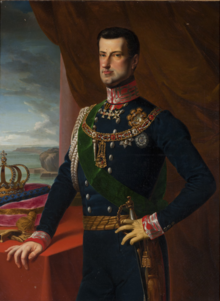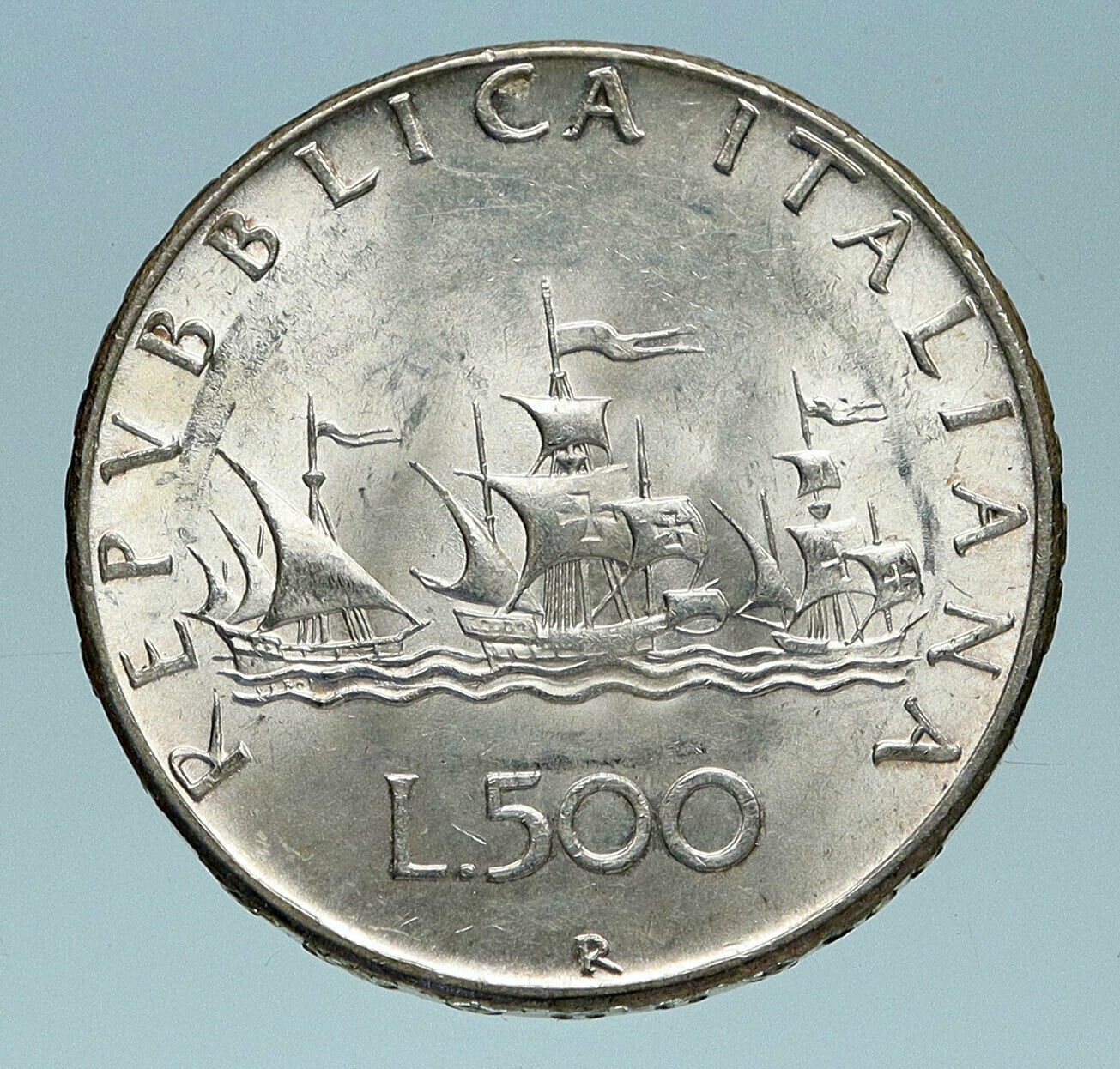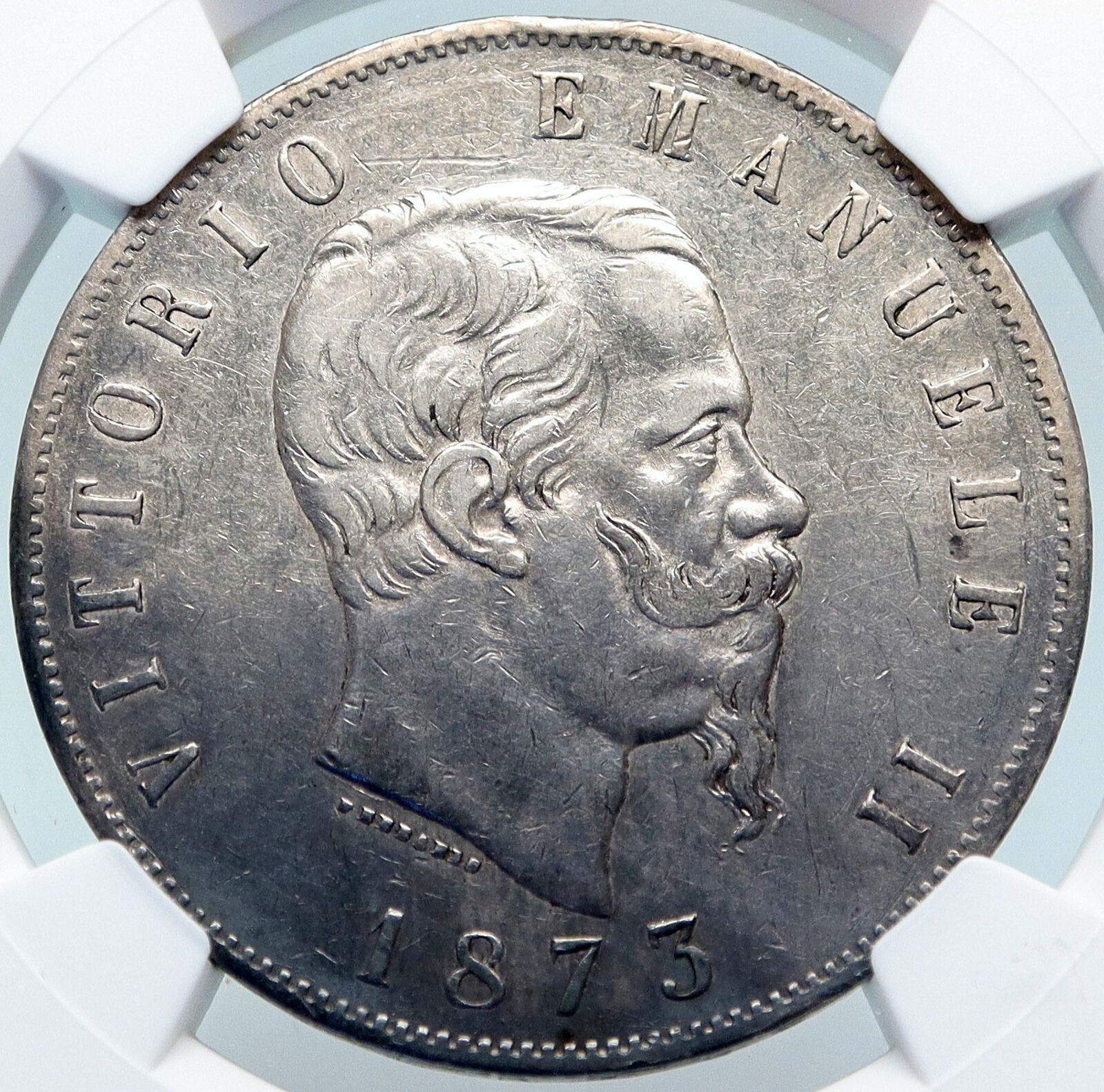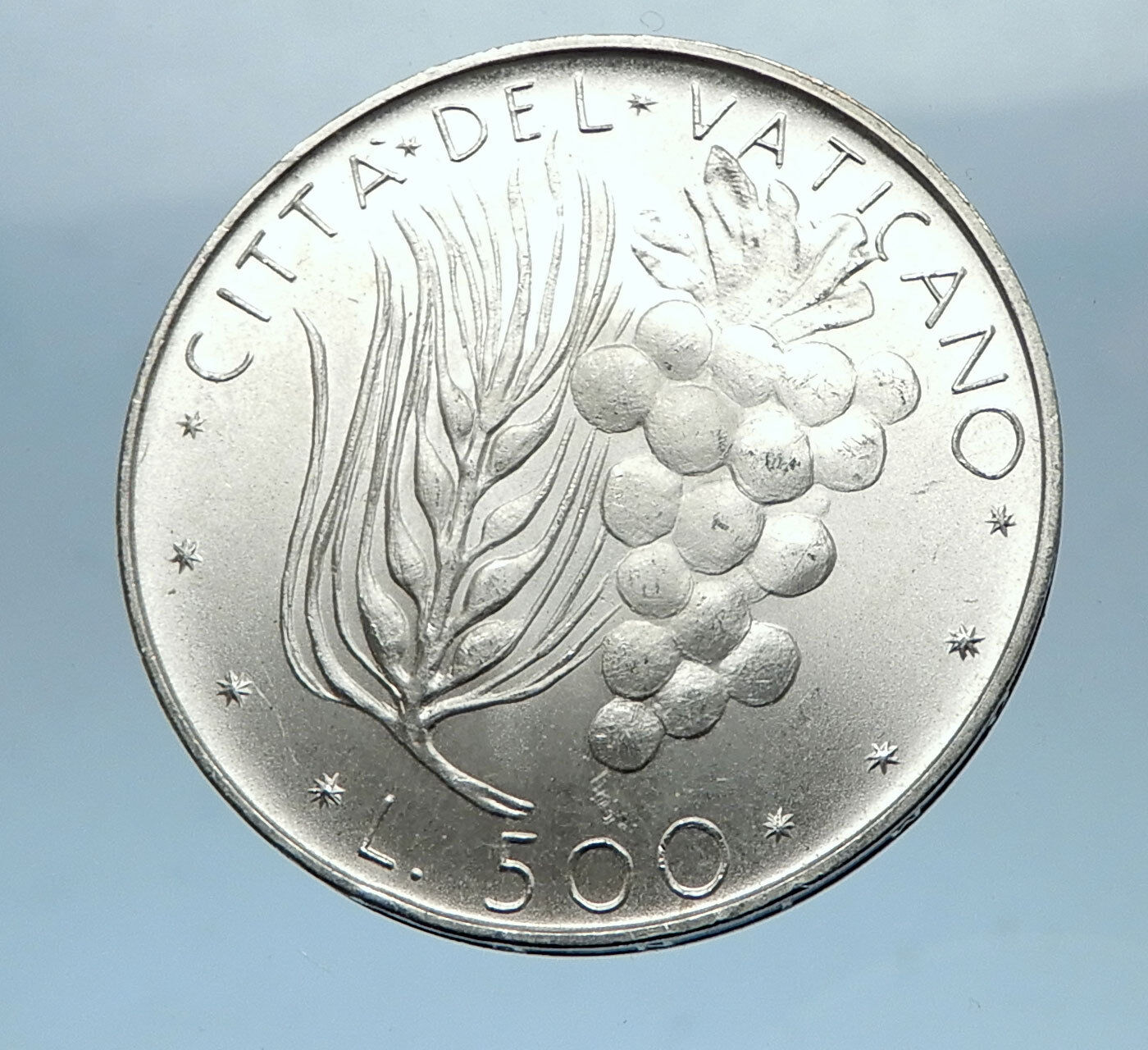|
Italy – Italian States – Sardinia
Charles Albert – King of Sardinia and Duke of Savoy: 27 April 1831 – 23 March 1849
1844 Silver 5 Lire 37mm (24.98 grams) 0.900 Silver (0.7234 oz. ASW)
Reference: KM# 130 | Engraver: Giuseppe Ferraris
CAR.ALBERTVS D.G.REX SARD.CYP.ET HIER· 1844 FERRARIS, Bust to right, date below.
DVX SAB· GENVAE ET MONTISF· PRINC· PED. &· P L 5 , Crowned Coat-of-arms, value below.
Edge Lettering:
FERT – FERT – FERT
You are bidding on the exact item pictured, provided with a Certificate of Authenticity and Lifetime Guarantee of Authenticity.
 Charles Albert (Italian: Carlo Alberto I; 2 October 1798 – 28 July 1849) was the King of Sardinia from 27 April 1831 until 23 March 1849. His name is bound up with the first Italian constitution, the Albertine Statute, and with the First Italian War of Independence (1848–1849). Charles Albert (Italian: Carlo Alberto I; 2 October 1798 – 28 July 1849) was the King of Sardinia from 27 April 1831 until 23 March 1849. His name is bound up with the first Italian constitution, the Albertine Statute, and with the First Italian War of Independence (1848–1849).
During the Napoleonic period, he resided in France, where he received a liberal education. As Prince of Carignano in 1821, he granted and then withdrew his support for a rebellion which sought to force Victor Emmanuel I to institute a constitutional monarchy. He became a conservative and participated in the legitimist expedition against the Spanish liberals in 1823.
He became king of Sardinia in 1831 on the death of his distant cousin Charles Felix, who had no heir. As king, after an initial conservative period during which he supported various European legitimist movements, he adopted the idea of a federal Italy, led by the Pope and freed from the House of Habsburg in 1848. In the same year he granted the Albertine Statute, the first Italian constitution, which remained in force until 1947.
Charles Albert led his forces against the Imperial Austrian army in the First Italian War of Independence (1848–1849), but was abandoned by Pope Pius IX and Ferdinand II of the Two Sicilies and was defeated in 1849 at the Battle of Novara, after which he abdicated in favour of his son, Victor Emmanuel II. Charles Albert died in exile a few months later in the Portuguese city of Porto.
The attempt to free northern Italy from Austria represents the first attempt of the House of Savoy to alter the equilibrium established in the Italian peninsula after the Congress of Vienna. These efforts were continued successfully by his son Victor Emmanuel II, who became the first king of a unified Italy in 1861.
Charles Albert received a number of nicknames, including “the Italian Hamlet” (given to him by Giosuè Carducci on account of his gloomy, hesitant and enigmatic character) and “the Hesitant King” (Re Tentenna) because he hesitated for a long time between the establishment of a constitutional monarchy and the reinforcement of absolute rule.
![Location of Italy (dark green)– in Europe (light green & dark grey)– in the European Union (light green) – [Legend]](https://upload.wikimedia.org/wikipedia/commons/thumb/b/ba/EU-Italy.svg/250px-EU-Italy.svg.png)  Italy, officially the Italian Republic (Italian: Repubblica Italiana), is a unitary parliamentary republic in Europe. Italy covers an area of 301,338 km2 (116,347 sq mi) and has a largely temperate climatelo Stivale (the Boot). With 61 million inhabitants, it is the 4th most populous EU member state. Located in the heart of the e Mediterranean Sea, Italy shares open land borders with France, Switzerland, Austria, Slovenia, San Marino and Vatican City. Italy, officially the Italian Republic (Italian: Repubblica Italiana), is a unitary parliamentary republic in Europe. Italy covers an area of 301,338 km2 (116,347 sq mi) and has a largely temperate climatelo Stivale (the Boot). With 61 million inhabitants, it is the 4th most populous EU member state. Located in the heart of the e Mediterranean Sea, Italy shares open land borders with France, Switzerland, Austria, Slovenia, San Marino and Vatican City.
Since ancient times, Greek, Etruscan, Celtic, and other cultures have thrived on the Italian Peninsula. Rome ultimately emerged as the dominant power, conquering much of the ancient world and becoming the leading cultural, political, and religious centreWestern civilisation. During the Dark Ages, the region suffered sociopolitical collapse amid calamitous barbarian invasions, but by the 11th century, numerous Italian city-states rose to great prosperity through shipping, commerce and banking, and even laid the groundwork for capitalism. The Renaissance led to a flourishing of Italian culture, producing famous scholars, artists, and polymaths such as Leonardo da Vinci, Galileo, Michelangelo and Machiavelli. Italian explorers such as Marco Polo, Christopher Columbus, Amerigo Vespucci, and Giovanni da Verrazzano discovered new routes to the Far Eastst and the New World, helping to usher in the European Age of Discovery. Nevertheless, Italy remained politically fragmented and fell prey to European powers such as France, Spain, and later Austria, subsequently entering a long period of decline that lasted until the mid-19th century.
 After various unsuccessful attempts, the second and the third wars for Italian independence resulted in the eventual unification of most of present-day Italy by 1866. From the late 19th century to the early 20th century, the new Kingdom of Italycolonial empire, becoming a great power. However, southern and rural areas of the country remained largely excluded from industrialisation, fuelling a large and influential diaspora. Despite being one of the main victorsrs in World War I, Italy entered a period of economic crisis and social turmoil, leading the way to the rise of a Fascist dictatorship in 1922. The subsequent participation in World War II on the Axis side ended in military defeat, economic destruction and civil war. In the years that followed, Italy abolished the monarchy, reinstated democracy, and enjoyed a prolonged economic boom, thus becoming one of the world’s most developed nations. After various unsuccessful attempts, the second and the third wars for Italian independence resulted in the eventual unification of most of present-day Italy by 1866. From the late 19th century to the early 20th century, the new Kingdom of Italycolonial empire, becoming a great power. However, southern and rural areas of the country remained largely excluded from industrialisation, fuelling a large and influential diaspora. Despite being one of the main victorsrs in World War I, Italy entered a period of economic crisis and social turmoil, leading the way to the rise of a Fascist dictatorship in 1922. The subsequent participation in World War II on the Axis side ended in military defeat, economic destruction and civil war. In the years that followed, Italy abolished the monarchy, reinstated democracy, and enjoyed a prolonged economic boom, thus becoming one of the world’s most developed nations.
Italy has the third largest economy in the Eurozone and the eighth largest economy in the world. It has a very high level of human development and enjoys the highest life expectancy in the EU. Italy plays a prominent role in global military, cultural and diplomatic affairs and is also considered to be a major regional power in Europe. Italy is a founding and leading member of the European Union and the member of numerous international institutions, including the UN, NATO, the OECD, the OSCE, the WTO, the G7/G8, G20, the Union for the Mediterranean, the Council of Europe, Uniting for Consensus, and many more. As a reflection of its vast cultural wealth, Italy is home to 51 World Heritage Sites, the most in the world, and is one of the most visited countries.
|





 Charles Albert (Italian: Carlo Alberto I; 2 October 1798 – 28 July 1849) was the King of Sardinia from 27 April 1831 until 23 March 1849. His name is bound up with the first Italian constitution, the Albertine Statute, and with the First Italian War of Independence (1848–1849).
Charles Albert (Italian: Carlo Alberto I; 2 October 1798 – 28 July 1849) was the King of Sardinia from 27 April 1831 until 23 March 1849. His name is bound up with the first Italian constitution, the Albertine Statute, and with the First Italian War of Independence (1848–1849).![Location of Italy (dark green)– in Europe (light green & dark grey)– in the European Union (light green) – [Legend]](https://upload.wikimedia.org/wikipedia/commons/thumb/b/ba/EU-Italy.svg/250px-EU-Italy.svg.png)
 Italy, officially the Italian Republic (Italian:
Italy, officially the Italian Republic (Italian:  After various unsuccessful attempts, the second and the third wars for Italian independence resulted in the eventual unification of most of present-day Italy by 1866. From the late 19th century to the early 20th century, the new Kingdom of Italycolonial empire, becoming a great power. However, southern and rural areas of the country remained largely excluded from industrialisation, fuelling a large and influential diaspora. Despite being one of the main victorsrs in World War I, Italy entered a period of economic crisis and social turmoil, leading the way to the rise of a Fascist dictatorship in 1922. The subsequent participation in World War II on the Axis side ended in military defeat, economic destruction and civil war. In the years that followed, Italy abolished the monarchy, reinstated democracy, and enjoyed a prolonged economic boom, thus becoming one of the world’s most developed nations.
After various unsuccessful attempts, the second and the third wars for Italian independence resulted in the eventual unification of most of present-day Italy by 1866. From the late 19th century to the early 20th century, the new Kingdom of Italycolonial empire, becoming a great power. However, southern and rural areas of the country remained largely excluded from industrialisation, fuelling a large and influential diaspora. Despite being one of the main victorsrs in World War I, Italy entered a period of economic crisis and social turmoil, leading the way to the rise of a Fascist dictatorship in 1922. The subsequent participation in World War II on the Axis side ended in military defeat, economic destruction and civil war. In the years that followed, Italy abolished the monarchy, reinstated democracy, and enjoyed a prolonged economic boom, thus becoming one of the world’s most developed nations.




